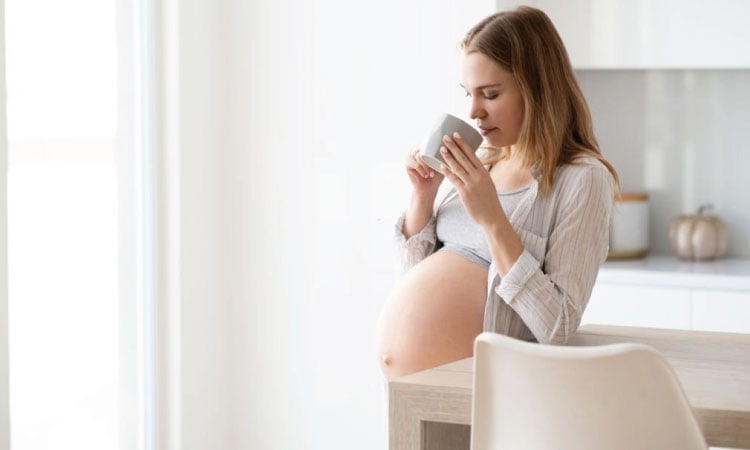Consumption of green tea and folic acid absorption is a concern for all pregnant women as most ditch their caffeinated drinks for green tea as it is known to have lesser caffeine content. But studies have shown that when women are drinking a lot of green tea, they have lower levels of folate in their system. Folate and folic acid is vital for all humans and much more important for pregnant women in order to prevent birth defects in babies. Let us discuss more.
We all know that caffeine consumption is advised to be limited when either trying to conceive or after one gets pregnant. However, to keep the batteries charged up, green tea is often used as a substitute for other caffeinated drinks, especially tea and coffee. Though not entirely caffeine free, green tea does have less caffeine than the regular cup of tea or coffee, and so it is not uncommon to see pregnant women sipping cups of green tea. However, research conducted on the subject has concluded that even though green tea may help with increasing the cervical mucus when trying to conceive, it can, however, adversely affect the neural tube development of the baby in the first trimester. But why is it that folate or Folic acid is so important during pregnancy?
Why Is Folic Acid Important During Pregnancy?
As told by our panel gynaecologist Dr Ankita Patel Tayal, folic acid, or folate, is basically the synthetic form of vitamin B9. Folic acid helps the body to produce new cells and maintain the older ones, and all of us need it. However, when trying to conceive and during pregnancy, folic acid assumes a lot of importance in preventing NTDs in the unborn baby. It has been particularly found to be helpful in preventing neural tube defects of the spinal cord and the brain. Folic acid is also found to help prevent other defects like cleft lip, cleft palate and other birth defects related to the heart. Studies have also linked folic acid to a lesser risk of developing pre-eclampsia. Folic acid is also important for the proper development and functioning of the placenta, that happens at a rapid pace and the development of the fetus.
Green Tea And Absorption Of Folic Acid During Pregnancy

So, coming back to green tea during pregnancy and folic acid absorption, a research conducted in 2008 established the fact that green tea lowers the body’s ability to absorb folic acid properly. Green tea has antioxidant compounds such as catechins which block intestinal folic acid absorption- meaning that a pregnant woman who has green tea passes less folate to the baby across the placenta. Thus, green tea directly affects the absorption of folic acid even if you are taking folate supplements.
This especially deserves attention as it is the neural tube that actually becomes the central nervous system of the baby. It comprises of the brain and the spinal cord. Deficiency of folic acid during pregnancy can cause the birth defect Spina bifida – wherein the bones of the spine do not form properly around the baby’s spinal cord. Though rare, this condition can vary in degrees of severity – and folic acid is found to help greatly in preventing it. Hence, green tea should not be consumed in more than recommended quantities and one should exercise caution. The same is also true for black tea.
Green Tea During Pregnancy First Trimester
Large amounts of green tea should not be consumed during the first trimester of pregnancy- reason being 23rd and 27th days of pregnancy are crucial for neural tube development. Studies have it that different parts of the neural tube close on these given days. Over-consumption of green tea during pregnancy first trimester can adversely affect the absorption of folic acid and cause spina bifida malformations. It is best to limit green tea consumption to a cup or two to steer clear of developing malformations in the neural tube. Avoid brewing it strongly, and have it no more than the recommended amounts. Also remember never to drink green tea when you have your food as green tea can affect the consumption of iron from non-meat foods like beans and tofu. This may particularly affect you if you are a vegetarian.
Can Green Tea Cause Miscarriage
Since we know now that green tea during pregnancy when taken in higher doses can cause significant effect on folic acid absorption thus affecting the unborn baby’s health, the next concern may be if green tea can also cause a miscarriage. The link is established through higher consumption of caffeine and caffeinated beverages, especially during pre-pregnancy and early stages of pregnancy. In a Danish study pregnant women who had even 2 cups of coffee, herbal teas or green teas were found at a higher risk of having spontaneous abortions compared to women who did not have any tea during their pregnancy. The rate of fetal caffeine elimination is very slow compared to maternal caffeine elimination and this can significantly affect an unborn baby’s blood supply through the placenta. Excess quantities of caffeine in pregnant women is also found to affect hormonal balance of the fetus. In all events, caffeine should be best avoided or consumed in very moderate levels during pregnancy, provided you do not have any complications whatsoever.
Related Reading: 18 Foods That Can Cause Miscarriage In Early Pregnancy
Calculate Due Date With LMP
How Much Folic Acid Is Required When Pregnant?

Most women are recommended to start taking folic acid supplements before they actually conceive, that is in the planning stage. This is because the neural tube developments take place during the very early days in the pregnancy, and a lot of women are likely to miss out on that time. A general recommendation varies from 400 mcg to 800 mcg every day for pregnant women, but less than 1000 mcg. Women who are obese, overweight or suffer from diabetes may be prescribed a higher dosage of folic acid during pregnancy.
Related Reading: 18 Early Signs Of Pregnancy Before Periods
How Can I Have Folic Acid Through Food?
Folate is difficult to get absorbed from food sources because it gets destroyed in the process of cooking. Though lentils, avocadoes, beans, citrus fruits and dark green vegetables are good sources of vitamin B9, pregnant women are often advised to take folate supplements to get the required amount of folic acid. Many multivitamins too come with folic acid.
What Are The Signs Of Folic Acid Deficiency?
Though subtle, signs of folic acid deficiency may not affect your daily life as such, but when you are making a baby, the affect can be huge. General symptoms of folic acid deficiency include anemia, irritability, loss of appetite, headaches, and loss of weight – which may further make you feel weak and palpitate.
How Can I Make Sure My Green Tea Is Not Interfering With Folic Acid?
The first thing to do would be to limit the green tea intake, especially if you are obese, overweight, have diabetes or have a history of carrying a baby who was born with NTD. The second step would be to ensure that you have lightly brewed green tea, no more than 2 cups a day, and limit the consumption to bare minimum during the first trimester. The third step should be to ensure that you eat foods that are rich and folate, and also tale a folic acid supplement everyday as recommended by your doctor.
Does Green Tea Affect Pregnancy?

As such, there has been no medical conclusion that has concluded that pregnant women should not have green tea. However, the limits of caffeine consumption must be followed during the gestation period and you should not exceed drinking more than a cup or two of green tea during pregnancy. Remember, pregnancy is a very delicate time for you, and the more cautious you are about your health, the better health the baby will inherit. Enjoy your green tea, but within moderation only.
Green tea may be a great alternative to your cup of tea or coffee, but consuming it in large quantities everyday can prove to be detrimental for your pregnancy and the baby.


